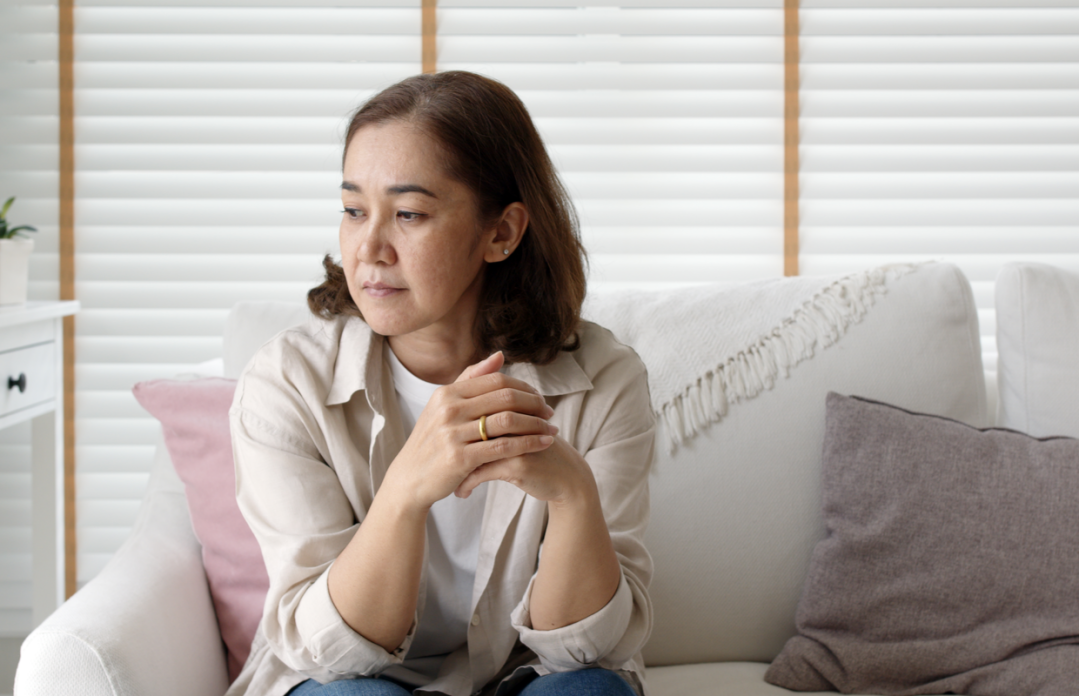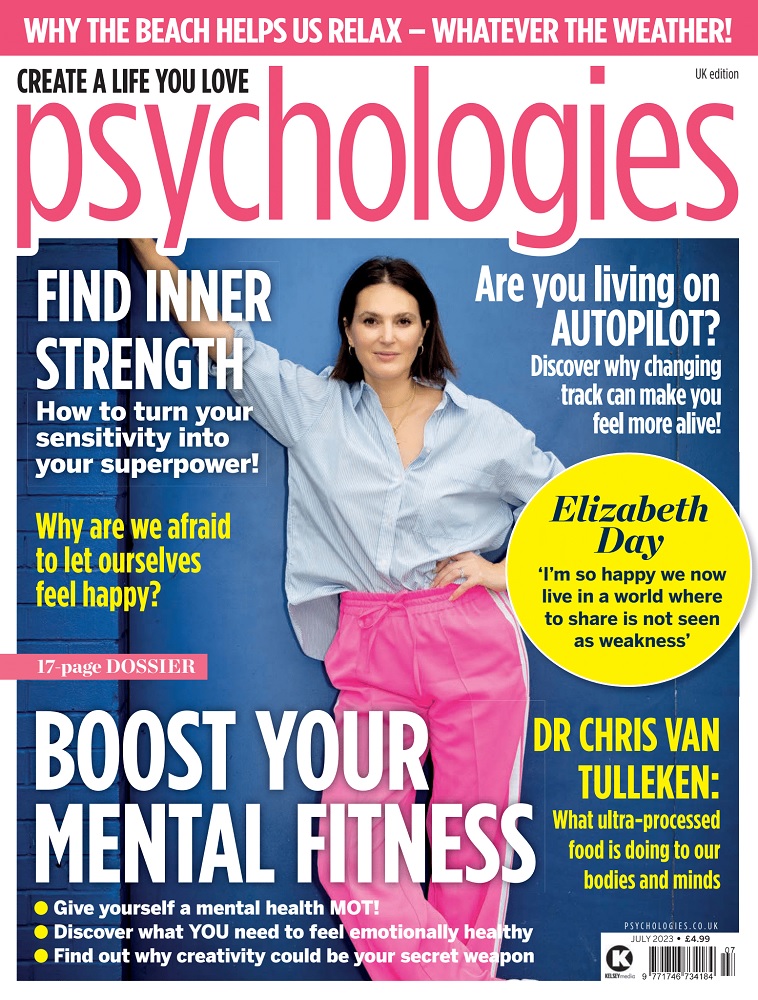How to cope with emotions during menopause
If you're struggling with mood swings during the menopause, you're not alone. Learn how to take back control and cope with those hormonally-charged emotions...

Hormonal changes in midlife do present a challenge, but can also bring about an opportunity for growth and renewed positivity, discovers Rebecca Frank. Here’s how to cope with the emotions that arise during menopause and embrace the journey…
I’ve always been fairly steady when it comes to my emotions. If I’m not in a great mood, there’s usually a good reason: a bad night’s sleep, a hangover, work stress, infuriating husband/ children… But, recently, my moods have been more up and down than straight and steady.
Some days, I can take on the world: I’m a patient mum, efficient at work and an attentive friend – positive and resilient. And, on other days, I lie awake panicking about anything and everything, from my tax return to whether we have enough milk for breakfast, feeling overwhelmed by life and irritated by everyone.
My lightbulb moment came whilst my teenage daughter and I were standing in her bedroom screaming at each other (about the state of said bedroom), and it felt like looking in a mirror. It was suddenly obvious that here were two females with wildly fluctuating hormones at opposite ends of the menstrual cycle, raging together like lunatics. The perfect storm.

How menopause affects your emotions
It turns out, I’m not alone, and am in fact in very good – if a little fraught – company. At her menopause clinic, Dr Louise Newson says that almost every patient she sees will be experiencing some kind of emotional impact related to hormonal changes.
‘You really can run the gauntlet of feelings during the perimenopause and menopause,’ she explains. ‘Although a lot of the focus can be on physical symptoms, such as hot flushes, I often find it’s the emotional effects that my patients find the most difficult and distressing to deal with.’
Staring down my teenage daughter in her bombsite of a bedroom, it was a shock to consider myself just as much at the mercy of my hormones; in my mid(ish)- 40s and with no physical red flags, I hadn’t considered that I might be perimenopausal.
When does perimenopause begin?
But Dr Newson tells me that hormonal changes, which include falling levels of oestrogen (but also progesterone and testosterone), can start up to 10 years before the menopause (the date of your last period). With the average age of menopause being around 51, there’s no denying its steady forward march.
But the good news is that, now, we’re starting to talk about menopause without feeling the need to whisper or apologise for it and stripping back the taboo, and there’s plenty you can do to help with the emotional as well as physical impact of changing hormones.
Whether you’re experiencing anxiety, brain fog, low mood or self-esteem, sleep problems, agitation or all the above, you can lift your head out of the sand and know that you’re not going crazy, and you can learn how to cope with emotions during menopause.
‘Common and normal are different,’ says Dr Aviva Romm, a medical doctor. ‘Being a woman is not a diagnosis and you can reclaim what is normal – a life in which your hormones aren’t whipping you around.’
How to cope with emotions during menopause: 5 expert tips

1. Complete an emotional audit
Writing down how you feel is the best way to really understand your emotions, get to know your triggers and become kinder and more patient with yourself. When you look back on your words, you’ll be able to console yourself that these intense emotions do pass, and that you won’t feel that way forever.
Writing down your feelings will help you learn how to cope with the emotions during menopause, however, you might find this hard at first because, as Dr Romm explains, ‘We’re all so busy that we’ve become disconnected from how we actually feel’.
She recommends trying to consciously become more aware of the sensations and messages you’re getting from your body and mind when it’s stressed.
Locate the stress in your body
This can be physical symptoms, such as tense shoulders, shallow or rapid breathing, a racing heart, or digestive problems. Or you might find your feelings and thought patterns change, with increased anxiety, worry, ruminating, negative thoughts, and overwhelm.
‘We feel our emotions in our body,’ explains Dr Jan Smith, a psychologist. ‘So, when you notice one, take a moment to locate where in your body you’re experiencing it. Then try to name what this emotion is.’
You might feel distressed by your thoughts or emotions, especially if they’re different from usual or very intense. ‘When emotions become overwhelming, they can trigger difficult thoughts, such as “This will never end” or “Everyone is coping better than I am,”’ says Dr Smith.
Thoughts verses facts
‘Our minds then convince us that we’re not the person we once were and that our future will be bleak. It’s worth reminding yourself that your emotions are thoughts at that moment, and not facts. You are a person experiencing these emotions and there is more to you than how you feel and think.’
You could record your emotions in a notebook or journal, or use an app such as Dr Newson’s Balance. ‘It can be easy to wrongly blame lots of menopause symptoms on the stresses and strains of daily life, so if you’re noticing any emotional or physical changes, write it down,’ says Dr Newson.
‘Keeping a track of symptoms helps you to create your own personalised health report, which is incredibly useful for any medical appointments, to ensure you get a prompt diagnosis.’

2. Know how to say no
There’s no denying that women tend to shoulder more daily work than men. Even when we are the primary breadwinners, we still do the lion’s share of housework and childcare.
‘We also do more “emotional labour” – the job of keeping everyone happy,’ says Dr Romm. Women get asked to “help out” more than men, whether it’s at school, work or with ageing parents, and we tend to do it all because we don’t like to say no.
‘Women have an incredible capacity to take things on, but often at an expense,’ says Dr Romm, referring to how a sustained high level of the stress hormone cortisol can lead to many issues, from impaired digestive and immune function, disturbed sleep and food cravings, to weight gain, loss of libido and gynaecological problems.
Know your own stress capacity
‘Turning off chronic stress is hard – after all, it’s addictive.’ If you’re already at capacity, ask yourself: ‘What kindness can I show myself?’ If that’s slowing things down and asking for some support or simply saying, ‘I’m sorry I can’t take on any more right now’, then that’s the right thing to do for everyone.
Saying ‘no’ more often to the outside world and ‘yes’ to yourself is an important and very effective shift – but letting go can be scary, which is why you need to soothe your nervous system with some active relaxation. Overall, this can help you learn how to cope with emotions during menopause.
‘Remember to watch out for your mind saying, “You don’t have time for this” or “It’s selfish,”’ says Dr Smith. ‘Try to reframe thoughts like this and, instead, say: “Self-care is healthcare” or “Caring for myself means I can be more patient with my family.”’
Take ownership over your health
When it comes to your actual healthcare, it’s equally important to be assertive – studies show that women are especially likely to try to ‘please’ our care providers.
It can be hard to trust yourself, especially if your doctor is telling you you’re fine or suggesting a treatment or test that you don’t want. Don’t be pressured into making a decision; you have the right to say, ‘I’d like to think about that’.

3. Learn to actively relax
We live in a world that glorifies ‘busy’, but doing too much and resting too little can make the menopause transition much more difficult to manage. Make a conscious effort to pause throughout the day and deliberately notice how you feel, even if it’s just for five minutes.
Pay attention to your body
It can help to set your alarm every 90 minutes, stop what you’re doing and ask yourself what sensations are going through your body: Are you breathing deeply? Clenching your jaw? Are you sitting up straight? Furrowing your brow?
‘To truly know our own bodies, we must pay attention, which means turning off a lot of the distractions our lives are filled with – from Netflix to your phone to online shopping and anxiety-inducing news – in order to enjoy some quiet and stillness, and look within.
‘This will reduce those stress hormones and allow the body to rest and heal,’ explains Dr Romm, who says it can help you feel more positive if you make a point of celebrating any wins or small gains.
Reward the small wins
‘I recommend counting a win at the end of every day and building some rewards for yourself for motivation and fun,’ she says. ‘This can be as simple as a little extra “you time”: those shoes you’ve been eyeing up, a pedicure or massage, or just a day to yourself reading a book and sipping tea in peace.’
She advises making time for active relaxation, too – things that soothe your mind and make you feel calm, such as yoga, meditation, dance, walking, gardening, having a bath or doing some crafting.
Make time to meditate
Struggle with staying still? Try this speedy soother for instant relaxation…
- Wherever you are, sitting or standing, get comfortable and take a few deep breaths in through your nose and out through your mouth. If you’re sitting, close your eyes.
- Inhale to the count of four and say to yourself ‘I am’. As you exhale, to the count of eight, say to yourself ‘At peace’.
- Repeat this cycle of inhalations and exhalations four times.

4. Ask for help
‘Communication is crucial,’ says Dr Newson. ‘If you’re struggling emotionally, speak to your partner, family, manager and colleagues to give them an insight into how you’re feeling and establish what support they can give you.’
Lean into your friendships and support networks, or join a forum or online community where you can offer each other advice. Just knowing that there are other people feeling like you and hearing their experiences will make you feel less alone and anxious, which can help you learn how to cope with emotions during menopause.
‘The most significant antidote to fear is connection; to ourselves and others,’ explains Dr Smith. ‘The symptoms many women experience can create feelings of shame. When we feel shame, we’re more likely to retract from others, at a time when we need their support the most,’ she adds.
Seek professional help if you’re struggling
When it comes to getting professional help, Dr Newson says many women delay making an appointment. ‘The first thing I would urge is to seek help as soon as you need it. Don’t wait until things become unbearable.’
If you go to see your doctor with emotional symptoms and they want to prescribe you antidepressants, Dr Newson advises asking the reason why. ‘Many women are inappropriately prescribed antidepressants for menopause-related mood changes, but they won’t help in this case,’ she says.
‘The gold-standard treatment is hormone replacement therapy (HRT), to bolster depleted levels.’ Taking HRT can be a lifesaver for many, with benefits outweighing any risks, but it can take time to find the doses and brands that work for you.
‘It’s worth seeking out a well-informed doctor of menopause specialist, being persistent, and working out a solution together,’ says Kate Codrington, author of Second Spring: The Self-Care Guide To The Menopause (HarperCollins, £14.99).
‘My observation is that taking HRT turns the volume down on symptoms, but you will still need to manage stress, cut the rubbish food and beliefs, and rest more than you feel is reasonable.’

5. Accept the changes of menopause
If you’re experiencing extreme mood swings and irrational thoughts and behaviour, you might feel guilty or ashamed by the things you’ve said or done, and worried about what’s happening to you.
Dr Jan Smith says that learning to accept that your body and brain are undergoing a significant transformation can be helpful. ‘You’re learning about a different part of you that you haven’t experienced before, and so need to give yourself permission to understand yourself better,’ she says.
Don’t be surprised if you also find yourself grieving at times. ‘Grief and sadness are just part of the process and, if you can honour them, you’ll feel much lighter on the other side,’ says Codrington. ‘The average woman will have around 444 menstrual cycles in her lifetime – no wonder it’s a loss when our cycle ends. Even if it brings challenges or we hate it, it’s predictable.’
Acknowledge your menopause journey
You’ll probably feel a lack of control – things are changing, fluctuating, and if you don’t know how you’re going to feel or react from one day to the next, it can be really unsettling.
Acknowledging the journey that you’re on and having faith that you will come out of the other side will help keep you sane. Codrington says it can help to think of it like an archetypal hero’s journey, where you will be lost for a time, but will return wiser, stronger and happier.
Words: Rebecca Frank | Images: Shutterstock









